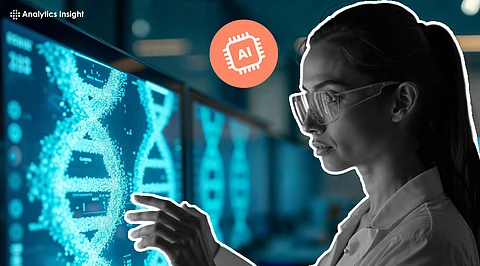

AI is accelerating biocomputing by enabling faster data analysis and biological modeling.
Artificial intelligence enhances synthetic biology through smart gene design and simulation.
The integration of AI in biocomputing is transforming healthcare, drug discovery, and diagnostics.
Biocomputing, a rapidly growing field that combines biology and computing, is being transformed by artificial intelligence. Biocomputing utilizes biological molecules to solve complex problems, functioning like a computer.
As AI continues to advance, biocomputing is transitioning from a research focus to practical applications. AI enhances accuracy and speed in areas such as drug discovery, gene analysis, and modeling biological systems, driving progress in the field.
Artificial Intelligence can sift through tons of data in biocomputing. Biological systems generate vast amounts of data, particularly when researchers examine genes, proteins, and the brain. It can take a while to sort and know what these facts mean if you do it by hand. AI models, primarily machine learning, can analyze and process these facts much faster.
For one, when identifying the order of genes, AI in biotech can detect trends in genetic data that are difficult to discern using conventional programs. This saves time and makes the results more accurate. In labs, AI can help predict how molecules will behave or how a cell might respond to a specific event. This makes experiments more effective and helps people make decisions faster.
One of the most significant ways AI enhances biocomputing is by improving the search for drugs. It often takes years and many tests to make a new drug. AI reduces this time by predicting how specific mixes will interact with cells or proteins. AI can sift through large databases of chemicals and identify the most promising ones to test.
Also Read: Can Artificial Intelligence Qualify for Human Rights Protection?
Synthetic biology is enhanced with the aid of AI. Synthetic biology is about making new living systems. These systems often have genetic switches that act like computer programs, but inside living cells. AI plays a significant role in enhancing these changes.
Artificial Intelligence can now predict how genes interact and identify the most effective DNA sequences, which helps researchers create improved biological components. For example, AI is being used to engineer bacteria that produce drugs, break down pollutants, or generate biofuels. Because accuracy is crucial in this field, AI helps minimize errors by identifying optimal gene designs.
Understanding protein folding and enzyme function is also crucial in biocomputing, but it needs detailed and computationally intensive methods. AI has developed faster methods to perform these tasks without compromising correctness.
AI can now guess how proteins will look faster than old physics ways by using models made from real protein facts. These guesses help researchers understand diseases and develop drugs that target the specific problem. Projects such as AlphaFold have demonstrated how AI can perform tasks in living systems that were once thought to be impossible.
The role of AI in biocomputing advancements will be crucial. Biocomputing helps identify what is wrong and tailor healthcare to each person. AI can analyze patient information, including their genetic makeup, to select treatments that are most effective for them. For instance, AI can detect cancer, genetic issues, or diseases in medical scans. Biocomputing basically connects biology with practical solutions.
AI enables faster reading of these facts and increases the likelihood of identifying issues early. Utilizing biocomputing with AI has already improved outcomes in areas such as cancer detection and the identification of rare diseases.
Also Read: Machine Learning in Science: Interpreting Gene Regulation
The future of biocomputing appears promising, with AI playing a significant role. We can expect to see substantial progress in brain-computer interfaces, bio-robots, and real-time health monitoring shortly.
As computers become more powerful, AI will handle increasingly complex tasks in our daily lives. But things aren't perfect. We must consider fairness, keep personal information safe, and remember that this type of research is expensive. Ensuring AI models are easy to understand and accurate is also key to trusting this growing area.
AI is changing biocomputing by making it faster, smarter, and more useful. AI enhances the utilization of living information, from discovering drugs to simulating living systems and identifying errors.
As AI tools continue to improve, they will play a larger role in the future of AI in biological computing, leading to new advancements and improved healthcare.
Q1. How does AI improve data processing in biocomputing?
A1. AI accelerates the analysis of large biological datasets, enabling faster and more accurate research.
Q2. What role does AI play in drug discovery?
A2. AI predicts molecular interactions, enabling the efficient identification and testing of drug candidates.
Q3. How does AI assist in synthetic biology?
A3. AI designs better genetic circuits by predicting gene behavior and optimizing DNA sequences to enhance their function.
Q4. Can AI help in understanding protein structures?
A4. Yes, AI predicts protein folding patterns more accurately and efficiently than traditional methods.
Q5. What are the benefits of combining AI with diagnostics?
A5. AI enhances diagnostics by quickly analyzing patient data for early and personalized treatment options.
